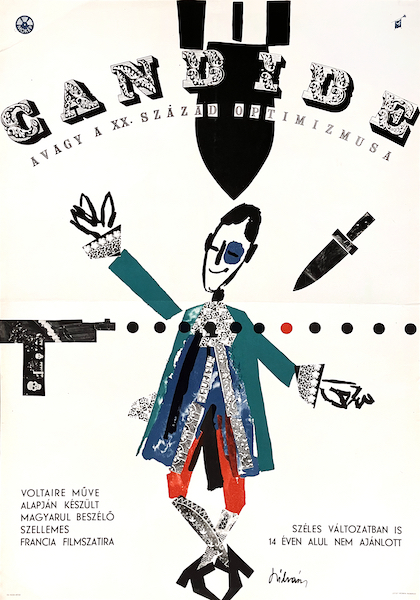
Description:
Candide or The Optimism in the 20th Century is a 1962 Hungarian movie poster designed by Nandor Szilvasy.
Candide or The Optimism in the 20th Century (original title: Candide ou l'Optimisme du XXe siecle) is a 1960 French film.
The film is based on Voltaire story "Candide, or Optimism" (1759), transferred to the twentieth century, during the Second World War, about the love of Cunégonde and Candide.
Director: Norbert Carbonnaux
Writers: Norbert Carbonnaux, Albert Simonin, Voltaire
Stars: Jean-Pierre Cassel, Pierre Brasseur, Daliah Lavi, Louis de Funes
(source: imdb.com)
Candide ou l'Optimisme du XXe siecle (English: Candide, or the Optimist of the Twentieth Century) is a 1960 French comedy drama film directed by Norbert Carbonnaux and written by Carbonnaux and Albert Simonin. It stars Jean-Pierre Cassel as Candide, Pierre Brasseur as Pangloss, Louis de Funes as the officer of the Gestapo, and Daliah Lavi as Cunegonde. The film is a 20th-century adaptation of Voltaire's 1759 social satire novel Candide, ou l'Optimisme. Set in the World War II-era, it follows the adventures of Candide, an orphaned Westphalian brought up in a baron's chalet. He falls in love with the baron's daughter, Cunégonde, and is thrown out of the house when the baron discovers them kissing. When war breaks out in 1939, Candide is drafted and then captured by the Nazis, but escapes and joins the International Red Cross. Candide's improbable adventures take him into a concentration camp to rescue his tutor, Pangloss; then he is off to South America (where he endures a series of revolutions), Borneo (where he is imprisoned by a primitive tribe), Moscow (where he accidentally foments a missile crisis between the Soviet Union and the United States), and New York (where he gets mixed up in a racial clash). Finally, back in France, he retires to a country house with Cunégonde, Pangloss, and a mysterious lady who saved him from a firing squad, and settles down to write his memoirs. (source: wikipedia.org)











